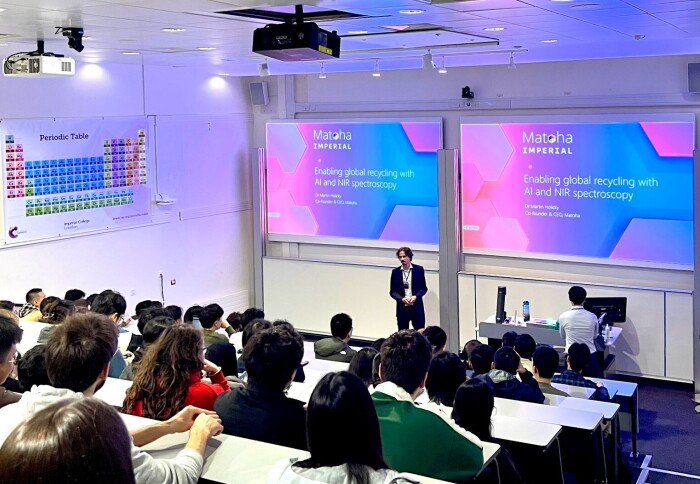Guest lecture by Matoha’s Dr Martin Holicky inspires huge turnout

Chemistry department set to launch new industrially collaborative lab experiment focused on AI-driven recycling solutions
The Department of Chemistry recently welcomed Dr Martin Holicky for an engaging Special Guest Lecture on cutting-edge applications of spectroscopy and artificial intelligence in recycling and the circular economy. The lecture, organised by Dr Benji Fenech-Salerno and Dr Rebecca L. Jones, drew over 130 students and staff eager to learn from Dr Holicky's entrepreneurial journey and technical expertise.
Dr Holicky, who completed his undergraduate and PhD studies at Imperial, shared the story of how he co-founded Matoha, a startup developing innovative spectroscopic devices for materials identification. He emphasised how the company grew from an idea conceived during the Faculty of Natural Science’ Make-a-Difference competition to a successful venture with customers across five continents.
The lecture provided valuable insights into the challenges of plastic and textile waste, highlighting the critical need for efficient sorting technologies. Dr Holicky explained, "Plastic waste is a huge problem...There's all kinds of waste that is just discarded. This not only causes extensive pollution, but also inefficiencies and lot of carbon dioxide emissions. And this is what led us to create material identification devices which enable the recycling of a wide range of materials."
Dr Holicky delved into the technical aspects of near-infrared spectroscopy and machine learning algorithms used in spectra identification. He offered students a preview of an upcoming third-year laboratory module developed in collaboration with the Department of Chemistry’s Dr Fenech-Salerno and Dr Jones, where students will work hands-on with Matoha’s devices and develop their own algorithms.
Dr Fenech-Salerno shared his excitement about the collaboration and the soon-to-be launched lab, saying, "We’re excited to give students this unique chance to apply their chemistry skills to real-world problems. This interdisciplinary lab not only immerses them in one of the most pressing global issues but also equips them with valuable machine learning and technical expertise. The strong turnout for Dr Holicky’s lecture shows just how eager our students are to contribute to global sustainability efforts."
Dr Rebecca L. Jones added "Our lab not only expands the sustainability content in our curriculum but introduces students to the challenges of plastic recycling. It also fosters exciting industrial collaborations, allowing students to learn from voices beyond Imperial."
The lecture concluded with Dr Holicky sharing valuable advice for aspiring entrepreneurs, encouraging students to engage with Imperial’s thriving startup community. His journey from student to successful entrepreneur highlighted the powerful role that academic-industry collaboration plays in driving innovation. The partnership between Matoha and Imperial is a testament to the university’s commitment to giving students early opportunities to tackle real-world challenges, equipping them with the skills and experiences needed to become the next generation of innovators.
The organisers would like to thank Dr Laura Patel for her assistance in developing the upcoming ID1 lab, as well as Dr Ravi Singh, Dr Sarah Johnson and Ms Raj Sandhu for assistance in coordinating the guest lecture.
Article text (excluding photos or graphics) © Imperial College London.
Photos and graphics subject to third party copyright used with permission or © Imperial College London.
Reporter
Dr Benji Fenech Salerno
Department of Chemistry
Dr Rebecca L. Jones
Department of Chemistry